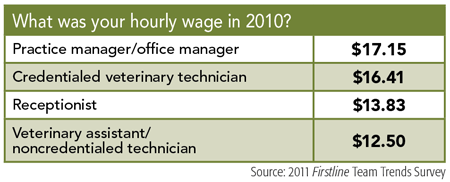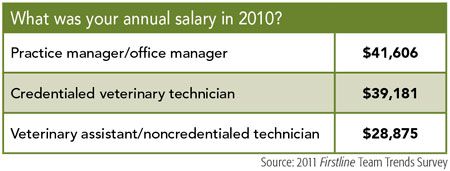The outcome of your income for veterinary team members
Your paycheck as a veterinary team member may not reflect all your hard work but before you get upset, get some perspective.
Team member pay hasn't gone up much of late, but this is no different than what employees in other industries are experiencing, says Gary Glassman, CPA, a partner with Burzenski & Co. in East Haven, Conn. "In order to avoid layoffs in this down economy, many hospitals had no choice but to give out little to no raises and cut team members' hours," he said. "Hospitals also compensated by not immediately filling vacant positions."
Glassman points out that many veterinary practices are small and lack the ability to promote employees, so team members often stagnate in their positions. "For example, a CVT who has worked in the same facility for 15 years may be at the top of the market wage scale with no ability to advance in the position," Glassman says. "While that experienced CVT should be entitled to a wage inflation increase, there's not much more the practice can pay him or her without considering them overpaid for the position."

More in this package:
What was your hourly wage in 2010?
What was your annual salary in 2010?
Reap the benefits: Benefits offered by veterinary practices
That said, team members should expect a yearly performance review and a pay increase that at least equates to inflation. "These raises have averaged only 2 percent to 2.5 percent over the last year—just like in other industries," Glassman says. "If you're looking for the best opportunity for growth, consider working for one of the larger hospitals, such as specialty or emergency hospitals."

More in this package:
What was your hourly wage in 2010?
What was your annual salary in 2010?
Reap the benefits: Benefits offered by veterinary practices
Reap the benefits
Check out these insights from Gary Glassman, CPA, to learn about the most important benefits.
The employee benefit you should be most concerned with is health insurance, Glassman says. Based on the increasing cost, the norm today is to split the cost with your employer 50/50. Reduced-price veterinary care also ranks tops on the important benefits list, but employers must be careful to comply with IRS guidelines of discounting services more than 20 percent (as stated in W-2 form).
You should definitely participate in an employer-sponsored retirement plan, provided your practice will match your contribution. Other low-cost benefits that employees should consider using are group life and disability plans, which are a great way to purchase much-needed insurance at a relatively low cost. Also, participating in continuing education benefits elevates the whole team and provides your practice with the greatest return on investment.
To see what other benefits practices are offering, as well as info on regional staff pay, see dvm360.com/teampay.
More in this package:
What was your hourly wage in 2010?